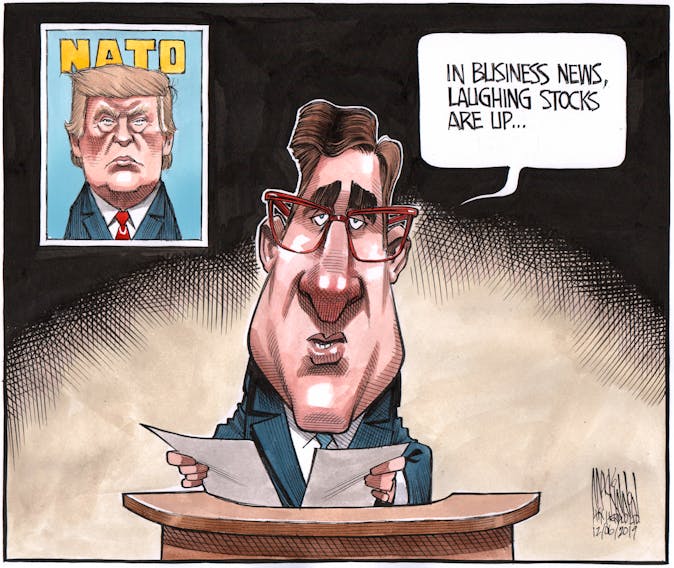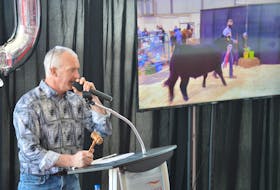PAUL BLACK
2020 has been a long year already — like a game of snakes and ladders on an endless loop.
Already, more than 1.2 million people have died worldwide from COVID-19.
Plagues of locusts — in biblical numbers — have threatened food supplies in Eastern Africa.
North America — indeed, the world — has been convulsed with anti-racism protests and counter-demonstrations triggered by horrific events, but hundreds of years in the making.
In Canada, we have experienced enough trauma and pain in 2020 for which hardly any adjective seems appropriate.
From the downing of Ukraine Airlines Flight 752, with 63 Canadians aboard to Canada’s worst mass shooting here in Nova Scotia in April, many of our souls are deeply bruised.
As a country, we’ve been on a cortisol roller coaster for months on end.
And many of us are holding on for dear life, waiting for Nov. 3rd to come.
Some people are already anticipating and lacing up, stretching and doing warmups for a cathartic victory lap on the political coffin of Donald J. Trump.
Others are worrying the imprint off their fingers as they doom-scroll through Twitter and the darkest corners of the internet, weighing theories on how The Donald might pull an October Surprise in November and chart a path back to the White House for another four years.
Many of us just don’t know what to think – but we know we can’t hold our breath from now until polls close (or, worse, until the Electoral College meets on Dec. 14).
As former Prime Minister Pierre Trudeau famously said of Canada-U.S. relations, in a speech to the Washington Press Club in 1969:
“Living next to you is in some ways like sleeping with an elephant. No matter how friendly and even-tempered is the beast, if I can call it that, one is affected by every twitch and grunt.”
During a visit to the U.S. State Department in 2005 with former Liberal Member of Parliament Arnold Chan, the head of the “Canada Desk” described the Canada-U.S. relationship to us as “inter-mestic” — not truly international, and not domestic — but a hybrid of the two.
Like any relationship, it’s complex.
If we had a vote on Nov. 3rd, it appears that Canadians would overwhelmingly support Joe Biden: by a margin of 5-to-1.
But we don’t have a vote. Instead, we’re reduced to decrying Trump’s antics, racism, see-saw pronouncements, and made-for-TV chaos.
If you spend a few minutes on Twitter, tune in to the political commentariat or just engage a fellow Canadian in a conversation about the U.S. today, you’ll be pulled into a “dump on Trump” conversation – at least five out of six times.
That “dump-on-Trump” conversation contains an implicit — if increasingly explicit — inference that if you vote for or support Trump, you’re to be dismissed.
You’re not with us; you’re against us.
And — let me be clear — I personally believe the analysis that shows Donald J. Trump to be a sociopath. I think he is a political dumpster fire of the first order. Someone who has had a destructive and damaging impact on our world in many ways.
If we’re honest with ourselves, we know that we’re not seeking to understand. In order to condemn his actions, we must denounce and dismiss him and those like him. We feel that’s what we’re supposed to do.
In the process of doing that, we are “othering.” Creating a safe “social distance” between us (the right-thinking, good humans) and them (the misdirected, condemnable others).
We want to put distance between us and them.
Trump could win. In fact, he might win. The so-called “shy” Trump voters are a larger collection of people than most of us might care to believe.
To some extent, whether he wins or not is at least somewhat beside the point. Because regardless if he wins on Tuesday, in the Electoral College on Dec. 14th, or not at all, there will have been some 55 million-65 million Americans who cast a ballot for him.
Our reaction to that outcome — for that, in and of itself, is an outcome — can be one of fear (that there are that many Americans who could vote that way), relief (that he doesn’t win), angst (that he does), or many other emotions.
Ultimately, what might serve us best in this situation is a little more curiosity. To do as Brian Stevenson of the Equal Justice Initiative says, and “get proximate” — not more distant.
Because this isn’t just a problem south of the border. In Canada, we are also sliding fast into a world where the narcissism of small differences attracts more attention than our shared experience. Politically and otherwise.
In his 2014 novel Crimes Against My Brother, New Brunswick author (and Member of the Senate of Canada) David Adams Richards writes: “… as you know, there are ways to convince yourself that the direction you want to go in is the direction you must take.”
After four years of Donald J. Trump, the direction most of us in Canada apparently want to go in is to build an intellectual wall between ourselves, and those we either disagree with, or don’t understand.
It’s certainly easier. And no one can deny that with the kind of 2020 we’ve had, so many of us are running on adrenaline that even the idea of reaching across those divides is exhausting, daunting and — yes — scary.
If we give in to that, and don’t follow our curiosity or “get proximate,” that may yet be his greatest legacy. Maybe he will have succeeded in his ambition to “build the wall,” after all.
Paul Black has worked as an adviser to politicians in Manitoba and Nova Scotia, and monitored elections in the Middle East, Ukraine and North Africa. He is a consultant who currently teaches politics at Acadia University in Wolfville, Nova Scotia.









